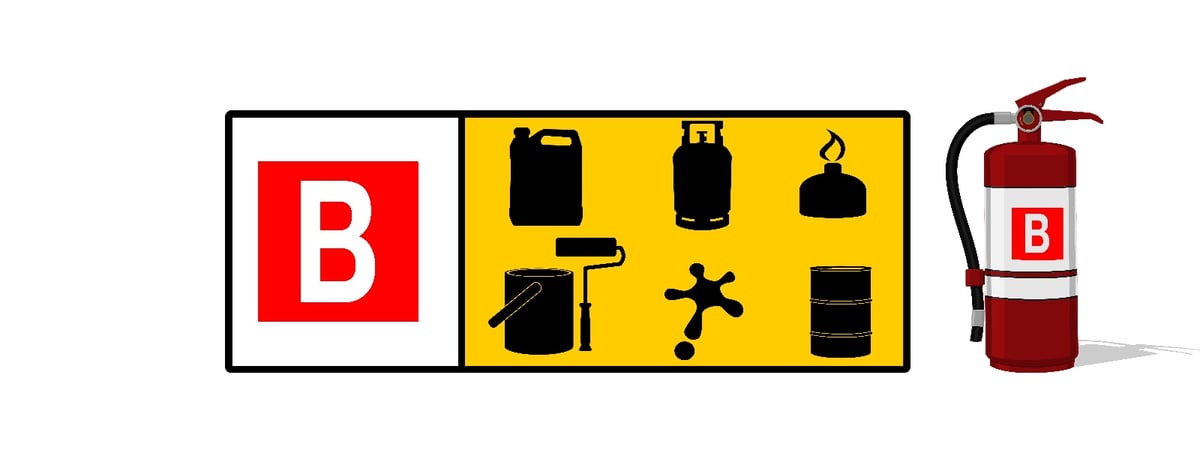
Since not all fires are created equal, neither are all fire extinguishers.
Life and property can be dependent upon the use of the correct fire extinguisher on a fire. This is especially true when fires involve more than standard combustible materials (such as wood, paper, etc.) and include elements such as flammable liquids, as is the case in Class B fires.
In this blog, read on to learn just what exactly constitutes a Class B fire, what types of extinguishers qualify as Class B fire extinguishers, and to better understand what a Class B fire extinguisher can be used for.
What Are Class B Fires?
As alluded to above, Class B fires are ones in which flammable liquids and/or gases become involved. They are the fuel source in the fire triangle (fuel, heat, oxygen + chemical reaction).
Flammable liquids include gasoline, diesel fuel, oils, tars, petroleum greases, solvents, alcohols, and oil-based paints. Flammable gases include things like propane, hydrogen, and butane.
The fuel sources of class B fires (gases and liquids) can be quite volatile and cannot be extinguished by water, which will only make the fuel source spread, thus spreading the fire. That is why it is important only to use extinguishing agents and methods designed specifically for Class B fires.
What Types of Extinguishers are Rated as Class B Fire Extinguishers?
Due to the nature of the Class B fires’ fuel, the best way to extinguish such a fire is to separate the fuel from its oxygen supply or by interrupting the chemical reaction of the fire triangle.
There are a variety of fire extinguisher types designed to accomplish this very task specifically on Class B fires:
- CO2: A carbon dioxide fire extinguisher works on a Class B fire by expelling CO2 to suffocate the fire, removing the oxygen necessary to keep it burning. It also helps with removing the heat, as the discharge is very cold.
However, note that due to how quickly the CO2 gas disperses, this extinguisher is only effective at a relatively close range – about 3-8 feet from the fire. - Foam: These extinguishers work on both Class A and B fires. The foam agent works on Class B fires by separating the fuel and the oxygen by creating a seal on the surface of the flammable liquid. However, these extinguishers will only be effective when the flammable liquid is not free-flowing.
- Dry Chemical: Dry chemical extinguishers, whether regular or multipurpose models are classified for B fires as their agent extinguishes a fire by interrupting the chemical reaction of the fire triangle. These extinguishers have a better range, as they use a compressed, non-flammable gas that can propel the dry extinguishing agent further.
- Clean Agent: A clean agent extinguisher uses an extinguishing agent that works by interrupting the chemical reaction of a fire and/or removing the heat, and is effective on Class B and C fires, and sometimes class A fires (depending on the size of the extinguisher).
They are called “clean” agents, as they rely on halogen and halocarbon agents that are safer for people and the environment and do not require the same level of clean up after use.
Most of the above extinguishers above can be rated for more than just Class B fires, but it is always important to pay attention to the label on any extinguisher you may reach for.
Furthermore, certain types of Class B extinguishers may still not be the most effective for the type of Class B fire your home or work environment is at the highest risk for, since some disperse better than others, among other differences.
Is Your Home or Business Protected by the Correct Extinguisher?
If your home or work environment includes flammable gases or liquids, you need to ensure that it is protected by a Class B fire extinguisher. But determining the best one for your specific hazards can be a bit more complicated.
To ensure that you have the best fire extinguisher for your home or business, call the experts at Koorsen Fire & Security. They can assess your unique situation and determine the extinguishers that would best protect your people and property.



